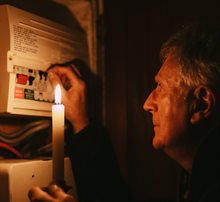This is the message of TNO’s paper on the security of our energy supply, which was presented at the ‘Strategic Autonomy in an Open Economy’ symposium in The Hague in early June. Other pillars of strategic autonomy discussed were economic security, national security, and digital sovereignty.
Want to read more about the urgency of energy supply security?
Short-term action
‘Without action in the short term, the security of our energy supply is at risk of a sharp decline, with major negative consequences for our economy and society’, says Harry van der Weijde, Senior Researcher of Strategy and Policy at TNO Vector.
‘At the same time, transitioning our energy system requires trade-offs we haven’t had to make for decades. This means new policies and new roles and responsibilities for governments, grid operators, and other stakeholders. And we also need a clear, widely shared definition of security of supply that includes not only availability but also affordability.’
Technical and social aspects
There are all sorts of definitions of what exactly security of supply is. The central government, the Electricity and Gas Act, and the International Energy Agency all put it slightly differently.
‘It is about making energy, in whatever form, available to all at an affordable price. This means it embraces much more than the technical side of delivery. The social aspect counts just as important, because energy has to also be affordable. This is why we’re looking into this issue at TNO. It brings together technology, market knowledge, social aspects, consumer behaviour, and geopolitics.’
Certainties become uncertainties
For a long time, with homegrown gas and a highly reliable electricity grid, security of supply was almost taken for granted. Grid operators ensured that electricity, gas, and heat reached households and businesses. But the playing field has changed dramatically. Certainties have given way to uncertainties. And this has raised new issues.
More parties with responsibilities
‘How, in today’s energy transition, do we keep the security of supply at 100% of close to it?’ wonders Harry aloud. ‘Alongside the technical question of whether grid operators can guarantee supply, there are now considerations like cost and revenue, environmental impact, and consumer behaviour. In other words, there are now more parties carrying responsibility.
Policymakers have to consider new trade-offs and politicians suddenly have to make principled choices. What is having a highly reliable system worth to us? And should certain categories of users be given priority in special circumstances? TNO supports them with objective, scientific information.’
Cost of sudden and long-term outages
More recently, there has also been a realisation that energy availability is not only economically important, but also affects our national security. In a 2019 study, TNO and SEO Economic Research pointed out that a sudden loss of gas supply could cost our country more than 10% of its GDP, as well as having safety and health implications.
Prolonged electricity outages have far-reaching consequences for our basic needs, physical and mental health. National grid operators such as TenneT and Gasunie point to the risk that security of supply could be jeopardised in the foreseeable future.
‘After the Russian invasion of Ukraine, the availability of LNG and quick action saved the security of gas supply in our country, but it remains to be seen whether this will be the case in the next crisis.’
Heat and hydrogen
When it comes to heat and hydrogen, the picture is also far from rosy, according to Harry. The full power grid can barely handle the influx of heat pumps. At the same time, the construction of heat networks is a far from smooth process.
Hydrogen currently only plays a minor role in the energy system, but if storage options are not developed in time, a future scenario is conceivable in which we could face a shortage of hydrogen during a prolonged cold spell with little sun and wind.
Intervention necessary
‘In the short term, the security of supply issue is already playing out in the electricity market. According to the recent Supply Security Monitor, it will be under pressure after 2030, while the estimate for 2030 already seems to be on the optimistic side’, says Sebastiaan Hers, Senior Consultant Energy Market and System at TNO, and co-author of the report.
‘However, security of energy supply is under pressure on several fronts, both in the short and long term. Energy markets will not be able to solve this on their own, making intervention necessary. We need an integral short-, medium- and long-term policy for different energy carriers. We also need to start making new short-term trade-offs and clarify definitions, roles, and responsibilities.’
This includes geopolitical uncertainties and tensions. To replace wind turbines and solar panels in the coming decades, we cannot rely on countries outside our continent. ‘Access to (raw) materials and components needs to be arranged, as does EU production of turbines, panels and electrolysers’, he says.
No time to lose
In short, our future security of supply has proved to be a much broader issue than merely technical. It includes all forms of energy in a mutual relationship: electricity, gas, heat, hydrogen. We were always able to maximise security of supply without worrying whether the costs outweighed the benefits. Those days are over.
‘The central government, grid operators, and market players will have to develop a joint approach. Although the urgency of this is not really being felt yet, there is no time to lose’, Harry van der Weijde concludes.
‘That is why TNO wants to take up the gauntlet with all the public and private parties involved, in order to map out more broadly than just technically what concrete measures can be taken to ensure security of supply in the coming decades.’
Want to know more? Get in touch with us

Harry van der Weijde
Senior researcher




